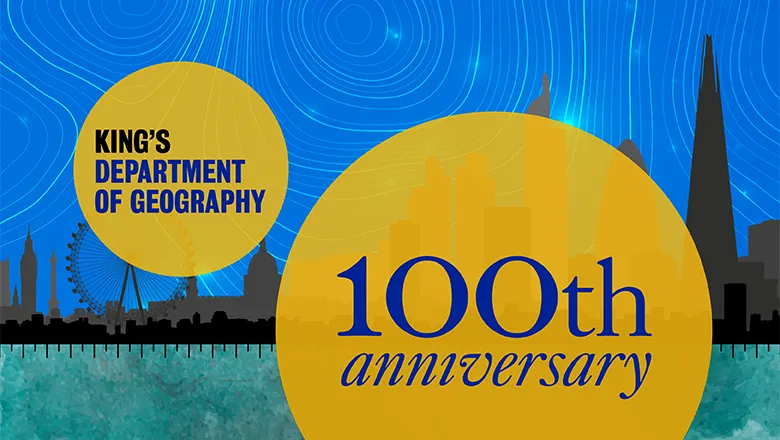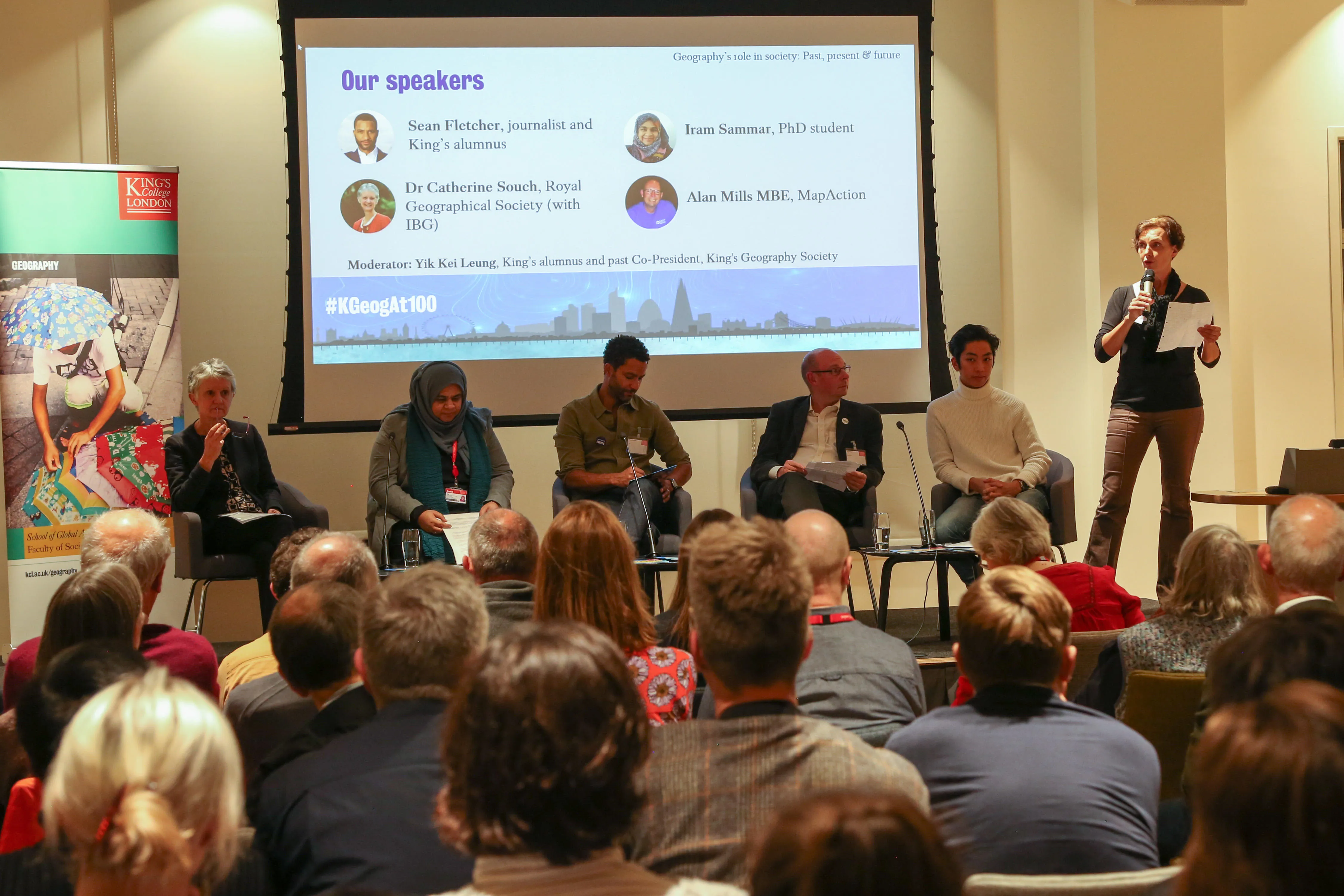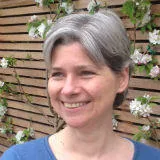I am proud to be leading such a wonderful department as it turns 100. The panel outlined the enormous value of geography to society. I’d also like to highlight the importance of the values that underpin our work. Social and environmental justice are at the heart of what drives us forward in both our research and education.
Professor Kate Schreckenberg, Head of the Department of Geography
08 December 2022
Geography at King's: a 100-year journey from training teachers to driving social and environmental justice
The Department of Geography has celebrated its 100 years at King’s, including everything it has achieved and what the future holds for this important discipline.

From its beginning 100 years ago when it was set up to help tackle an urgent shortage of geography teachers, Geography at King’s has evolved to become a department with social and environmental justice at the heart of its research and education.
To mark its 100-year journey, the department held a series of celebrations that looked at the past, present and future of the discipline and its vital role in today’s global society.
The main centenary event in November included a panel discussion and exhibition based on the research and teaching stemming from the department, including policy briefs, community work, data mining tools, satellite technology, and weather and pollution monitoring stations.
The panel discussion highlighted how Geographers offer the potential to understand global challenges at both the local level, as well as the complexities of the larger systems within which they play out. This is because of the systems perspective so integral to geographers.
King’s has set itself the ambition to play a central and transformational role in advancing the United Nations’ Sustainable Development Goals. The Department of Geography is wonderfully placed to ensure the College achieves this ambition, particularly when it comes to delivering education, research and impact across our campuses and the globe.
Professor Rachel Mills, Senior Vice President (Academic) and Senior Sponsor for King’s Climate & Sustainability
Geography’s role in society: past, present and future
The panel, moderated by Yik Kei Leung, former Co-President of the King's Geography Society, ranged widely, showing the relevance of geography to people of all ages and backgrounds.
Speakers on the panel included Sean Fletcher (King’s alumnus and journalist), Alan Mills MBE (MapAction, a current internship partner), Iram Sammar (Geography PhD student) and Dr Catherine Souch (Head of Research and Higher Education, Royal Geographical Society with IBG).
- Sean Fletcher: illustrated how his work has shown him that ‘everybody is a geographer’ with a deep understanding of the space, place and time they live in and a desire to share that knowledge if you ask the right questions.
- Iram Sammar: drew on her own experience as a geography teacher, Iram spoke about the need to teach geography in a way that recognises and resonates with students’ own highly diverse experience of space, place and time. Iram’s research looks at how to decolonise Geography teaching in the school classroom.
- Alan Mills MBE: explained how geography’s traditional focus on mapping has changed – in how it is done (with technology allowing for more remote mapping), who does it (increasingly by local people) and what is mapped (more focus on vulnerable populations). He highlighted the many opportunities for geographers to use their skills not just in their professional lives but also as volunteers. MapAction provides support in humanitarian emergencies,
- Dr Catherine Souch: spoke about the growing interest in geography among young people as the value of geography in addressing global challenges from climate change to sustainable cities and food systems becomes more apparent.
- Yik Kei Leung: gave the closing comment on the role of geography in driving forward measurable social and policy change, as illustrated by his own work with Think-Film, which uses film to bring challenging issues to the attention of different audiences.
The event was an example of the interdisciplinary community in the department, which is inclusive of students and researchers working at all levels.
A 100 year journey
The Department of Geography began life as part of the so-called ‘Joint School’ with LSE, established “to furnish the country with what is urgently needed – an adequate supply of teachers of geography”. Within the Joint School, which lasted into the 1990s, King’s was responsible for the physical geography components.
Being based in the Faculty of Social Science & Public Policy, the department today has a strong tradition of critical Geography and is well-known for its expertise in political ecology, whether applied to the nature of future urban environments or the often-contested nature of different forms of ‘development’ and its impacts on people and the environment.
At the same time, the department retains real strengths in physical geography, as exemplified by its work on wildfires, biodiversity, the movement of sand particles and pollution.
A key feature of the department is its applied nature and focus on achieving impact. This is exemplified by:
- several of staff having contributed as lead authors to recent IPCC reports with expertise ranging from how the melting of glaciers contributes to sea-level rise, to in-depth understanding of human migration and adaptation.
- staff having developed user-friendly tools which enable conservation organisations to identify appropriate places for conservation interventions.
- having contributed to improving the way in which national healthcare systems use big data to monitor and improve hospital quality and safety.
- having worked with grassroots partners to influence the way in which migrant women were considered in the UK’s 2021 Domestic Abuse Act.
Underpinning many of these activities is a strong focus on environmental and social justice, whether that is calling out the negative impacts of some conservation initiatives on local people, or the high levels of water insecurity in some of the world’s richest cities.
Today, the department is a leader in the use of innovative research methods, from cutting edge use of satellite data to understand, monitor and manage wild fires and their impact, to development of low-cost sensors that enable ordinary citizens to engage in weather and pollution monitoring, to visual methods (from theatre to body mapping and artistic installations) which provide an opportunity for people who often have little voice in conventional research to contribute their ideas.



